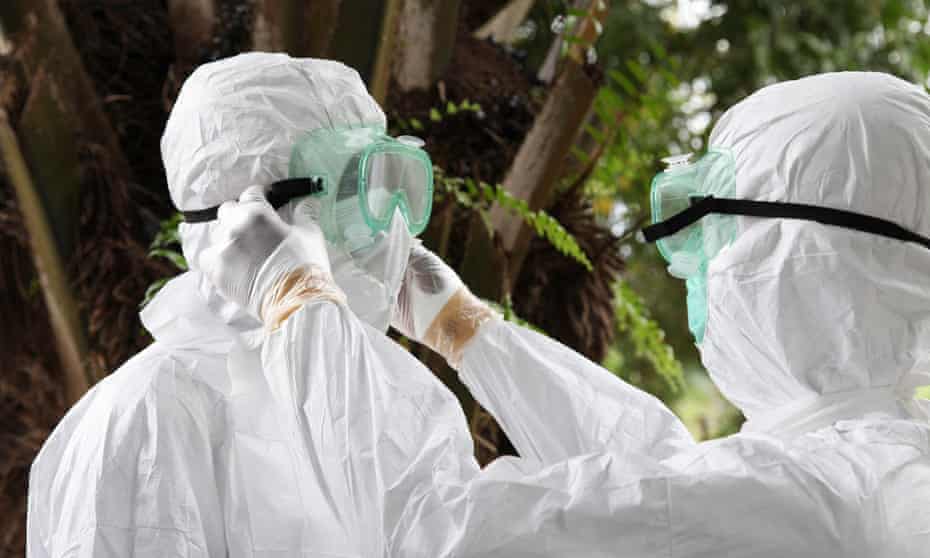I saw colleagues die of Ebola. Health workers must not become coronavirus Sacrifice again
Thursday, March 19, 2020
Add Comment
Copy Link below and Share with your Friends:
I saw colleagues die of Ebola. Health workers must not become coronavirus Sacrifice again
Imagine working in an underfunded, understaffed hospital facing a devastating disease outbreak. Imagine being forced to make impossible choices about who to treat and who to let die. Imagine coming home to your family, knowing you might be putting them at risk.
These are the awful situations we health workers faced in dealing with the 2014 Ebola outbreak in Libera. For me the greatest tragedy is hearing similar stories emerge from colleagues around the world who are up against the coronavirus. It terrifies me to see that developed countries health systems are at breaking point – I hate to imagine what this virus might do to my region next.
We health workers are not heroes. And we should not have to became martyrs on the job. We are professionals. We need personal protective equipment so we can stay healthy while saving lives. We need adequately staffed and well-resourced public health systems. We need strong government funding for our sector.
The sad reality is public health systems have been consistently understaffed, underfunded and undermined – and privatised or outsourced. The disastrous failure of austerity policies is exacerbating the strain of this outbreak on our sector – and with deadly impact.
Fractured, profit-driven health systems are simply unable to effectively respond to crises such as Ebola or coronavirus. In the US, many with the virus do not have adequate access to healthcare and may risk exacerbating the spread. The only way we can tackle this outbreak is through a massive, government-driven, public health response – best achieved through established universal public healthcare.
During the Ebola crisis, my union fought tooth and nail for personal protective equipment for workers – yet chronic underfunding, partially a result of IMF and World Bank loan conditionality, meant the resources needed simply weren’t available. The disease ended up killing over 8% of the country’s health workforce. Many of my comrades perished in the struggle.
In the aftermath, I met workers around the world through the global union federation Public Services International to fight for more resilient public health systems. Our Safe Workers Save Lives campaign called on governments to increase funding and make sure that, when public health emergencies arise, workers are not sacrificed in the fight. Sadly, our calls went largely unanswered. And now the worst is coming.
We health workers will be the group most affected by this virus outbreak. Many of us will die, our families left behind. Many of our deaths will have been avoidable. This time we must learn. Governments must massively increase funding for public health systems – immediately. It’s time to bury austerity once and for all. Never has the need for well-funded, resilient public health systems been clearer.
Imagine working in an underfunded, understaffed hospital facing a devastating disease outbreak. Imagine being forced to make impossible choices about who to treat and who to let die. Imagine coming home to your family, knowing you might be putting them at risk.
These are the awful situations we health workers faced in dealing with the 2014 Ebola outbreak in Libera. For me the greatest tragedy is hearing similar stories emerge from colleagues around the world who are up against the coronavirus. It terrifies me to see that developed countries health systems are at breaking point – I hate to imagine what this virus might do to my region next.
We health workers are not heroes. And we should not have to became martyrs on the job. We are professionals. We need personal protective equipment so we can stay healthy while saving lives. We need adequately staffed and well-resourced public health systems. We need strong government funding for our sector.
The sad reality is public health systems have been consistently understaffed, underfunded and undermined – and privatised or outsourced. The disastrous failure of austerity policies is exacerbating the strain of this outbreak on our sector – and with deadly impact.
Fractured, profit-driven health systems are simply unable to effectively respond to crises such as Ebola or coronavirus. In the US, many with the virus do not have adequate access to healthcare and may risk exacerbating the spread. The only way we can tackle this outbreak is through a massive, government-driven, public health response – best achieved through established universal public healthcare.
During the Ebola crisis, my union fought tooth and nail for personal protective equipment for workers – yet chronic underfunding, partially a result of IMF and World Bank loan conditionality, meant the resources needed simply weren’t available. The disease ended up killing over 8% of the country’s health workforce. Many of my comrades perished in the struggle.
In the aftermath, I met workers around the world through the global union federation Public Services International to fight for more resilient public health systems. Our Safe Workers Save Lives campaign called on governments to increase funding and make sure that, when public health emergencies arise, workers are not sacrificed in the fight. Sadly, our calls went largely unanswered. And now the worst is coming.
We health workers will be the group most affected by this virus outbreak. Many of us will die, our families left behind. Many of our deaths will have been avoidable. This time we must learn. Governments must massively increase funding for public health systems – immediately. It’s time to bury austerity once and for all. Never has the need for well-funded, resilient public health systems been clearer.

 Naijahitplay Promotion - Sure Music PR Plug
Naijahitplay Promotion - Sure Music PR Plug





















0 Comment
Post a Comment